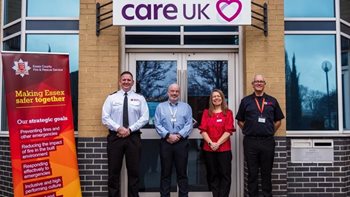World Antibiotics Awareness Week
Company news
Nov 24, 2015
This week marks World Antibiotics Awareness Week. Over the past 60 years we have come to take antibiotics for granted, treating them as a universal cure-all and taking them more often than might be necessary.
However, we are now paying the price for the overuse and misguided prescription of antibiotics, because so many bacterial infections have developed a resistance to them. Such is the threat to the world’s population from antibiotic resistance that the G8 has classified it alongside terrorism.
The recent Review on Antimicrobial Resistance estimates that by 2050 the global cost of antibiotic resistance will rise to £100 trillion and account for an extra 10 million deaths a year.
But it is not just over-prescription which is causing the problem – no new forms of antibiotics have been created for 30 years. As a consequence, health services across the world are struggling to contain bacterial diseases as the antibiotic arsenal available to them dwindles in effectiveness.
A world without antibiotics is a terrifying one – there would be no more safe routine surgery; a simple scratch could lead to serious infection or death; and bacterial diseases which until now we have had under control could rip through the human population.
This week Public Health England, in collaboration with Department of Health’s Expert Advisory Committee on Antimicrobial Resistance and Healthcare Associated Infections (ARHAI); the Department for Environment Food and Rural Affairs (DEFRA), the Devolved Administrations and professional bodies, has launched the Antibiotic Guardian campaign where those in health care, students and educators and members of the public are being asked to make at least one pledge towards ending the inappropriate use of antibiotics. You can find out more at www.antibioticguardian.com.
However, all is not lost and Plymouth is leading the battle in developing new antibiotics and championing methods of health care which reduce the risk of infection in a hospital environment.
Keeping infection at bay in hospital
The Peninsula NHS Treatment Centre in Plymouth opened just over 10 years ago – and in that time has had no hospital-acquired infections.
The hospital specialises in elective surgery, which means that it knows when patients will arrive and for which surgical procedure.
Patients are referred to the hospital by their GP or consultant, at which point they are given a date for an outpatient appointment. As part of that appointment swabs are taken and tested for any sign of MRSA. If the results come back as positive the patient is prescribed antibiotics and are readmitted for treatment when their results are clear.
Before arriving at Peninsula for treatment, patients are given a body wash as asked to use it for three days before admission.
All major surgery patients are given an antibiotic before surgery and three doses afterwards.
The hospital uses special dressings on patients who have had major surgery and may be in hospital for a few days. These special dressings mean that they do not need to be changed for several days after surgery, which gives the wound sufficient time to heal and be less susceptible to infection.
All members of clinical staff receive regular training on infection avoidance and control, and it has a zero tolerance to infection – any suspected infections are thoroughly investigated and actions taken accordingly.
Margaret Mahoney, Clinical Governance Manager at the Peninsula NHS Treatment Centre, said: “Good infection control is all about preparation before the patient comes to hospital, effective staff training and sound infection prevention and control procedures. We do use antibiotics to achieve this, but in a very targeted way. At the end of the day if we can prevent infection happening in the first place we can ensure that we avoid any unnecessary use of antibiotics going forward.”
Creating and developing the first new family of antibiotics for 30 years
Working from his lab in Plymouth University School Biomedical and Healthcare Sciences is Dr. Mat Upton, and he is on a mission to bring the first new family of antibiotics through the required tests and clinical trials so that they can be made available to doctors and their patients around the world.
Dr. Upton and his team are developing epidermicin, a new antimicrobial agent, to the point where it can be trialled in humans to combat diseases such as MRSA through use as a nasal spray.
In addition, and to test its effectiveness for other antibiotic resistance diseases, the team are investigating how a variant of epidermicin in ointment form performs in treating superficial skin infection in mice. By showing that it works on a variety of diseases and in a number of forms, researchers will be able to show that not only could epidermicin be a versatile addition to the health care arsenal, but that it also has commercial viability.
Plymouth researchers are also giving further investigation to identifying how epidermicin works, and will look at how it can be most effectively and safely produced to the scale at which it will be needed. They will continue to investigate how it could be used to fight still more antibiotic-resistant diseases.
Part of this will be precise guidelines for health services about how and when epidermicin can and should be used – moving away from the ‘scatter gun’ approach to prescribing antibiotics towards more targeted methods.
The Plymouth team recently signed up to a partnership with world-leading industrial biotechnology and synthetic biology business Ingenza, to develop an efficient, scalable microbial production system for epidermicin.
This will initially produce enough of the drug to carry out clinical trials, but will also put in place methods of production for when the drug can be made more widely available.
Said Dr. Upton: “No new classes of antibiotics have been discovered for 30 years and there is a critical need for new antibiotics to treat infections caused by resistant bacteria. If we don’t do this, we risk returning to the time before antibiotics where minor infections could be fatal and routine surgery is not possible. The project will develop methods for producing epidermicin family in large amounts, with the ‘lead’ drug investigated for use in human clinical trials for reducing infection following surgery."
He added: “Our partnership with Ingenza will support the development of an exciting new family of antibiotics that rapidly kill harmful bacteria, even at low doses. These ground breaking new medicines have huge potential to save lives, because they kill bacteria that cause some of the most significant diseases for which there are very few antibiotics left.”
How much do you know about antibiotics?
Antibiotics are not effective against coughs, colds, flu and most sore throats...
A. since these are mostly caused by viruses, which antibiotics do not work against
B. but antibiotics sometimes work against viruses, so I should take them just in case
C. however antibiotics work against everything
When I have a cough, cold or sore throat, I should...
A. book an appointment with my GP for all mild symptoms or illness
B. seek immediate emergency medical attention
C. check with a pharmacist about how to treat my symptoms
There are lots of colds going around. I’ve been told taking antibiotics ‘just in case’ can drive up the number of drug-resistant infections, but...
A. taking antibiotics when you don’t need to allows bacteria to develop a resistance to the antibiotic
B. only older people can get drug-resistant infections
C. taking antibiotics will help build up your defences and stop you getting a cold in the first place
My GP has only given me a short prescription of antibiotics but I think I need them for longer. I should...
A. use some of my friend’s antibiotics as they didn’t use all the ones they were given last year
B. take one less a day than prescribed, to make them last longer
C. take the antibiotics exactly as prescribed – or they may not clear the infection
Drug-resistant infections, also known as antibiotic resistant infections are serious because...
A. antibiotics may not work against resistant bacteria
B. without effective antibiotics many routine treatments or operations like chemotherapy, surgery and Caesarean sections will become increasingly dangerous or impossible
C. overuse of antibiotics means that antibiotic resistance will spread faster and faster
D. drug-resistant infections affect both humans and animals
E. all of the above
Drug -resistant infections: the facts
Antibiotics are not effective against coughs, colds, flu and most sore throats.
Most coughs, colds and most sore throats and flu are caused by viruses, which antibiotics do not work against. Antibiotics cannot help you recover from infections caused by viruses, such as common colds, and most coughs and sore throats, because antibiotics are only effective against bacterial infections. Mild infections with bacteria may also get better without antibiotics. Remember to wash your hands; this is the single best way to prevent the spread of respiratory tract infections.
If you have a cough, cold or sore throat, you should check with a pharmacist first about how to treat your symptoms. A pharmacist is an expert on medicines, and can help you treat your symptoms and pain with over the counter treatments. However, if you have severe symptoms and warning signs such as difficulty breathing or sharp chest pain for serious illness you should seek immediate medical attention; you can learn more at treatyourselfbetter.co.uk
Taking antibiotics when you don’t need to will allow bacteria to develop a resistance to the antibiotic. Bacteria adapt and find way to survive the effects antibiotics. These drug-resistant bacteria may also be called ‘antibiotic resistant’; antibiotics no longer kill these germs. The more you use an antibiotic, the more the bacteria become resistant to it. When you take antibiotics, it can also kill the good bacteria which lives in and protects your body, making you more susceptible to infection from other harmful and potentially drug-resistant bacteria and like most medicines, taking antibiotics can have side effects.
Drug-resistant infections are difficult to treat and can affect anyone; they are a particular threat to older people and those with weakened immune systems.
When antibiotics are prescribed by a health professional it is important that you always take it as directed. Antibiotics are given at a specific dose over a period of time to be optimal to clear an infection, changing the dose may reduce the effectiveness of the antibiotics and enable bacteria to develop drug-resistance. Never share your antibiotics with anyone else – they are for you only and may not be effective for different infections in another individual.
Drug-resistant infections, also known as antibiotic resistant infections are serious because:
• antibiotics may not work against resistant bacteria
• without effective antibiotics many routine treatments or operations like chemotherapy, surgery and Caesarean sections will become increasingly dangerous or impossible
• overuse of antibiotics means that antibiotic resistance will spread faster and faster
• drug-resistant infections affect both humans and animals
The spread of drug - resistant infections is one of the biggest threats facing us today; routine treatments and operations rely on antibiotics to work! We all need to act now to stop the spread of antibiotic resistance, or else we may not have them for much longer.
The Antibiotic Guardian campaign


